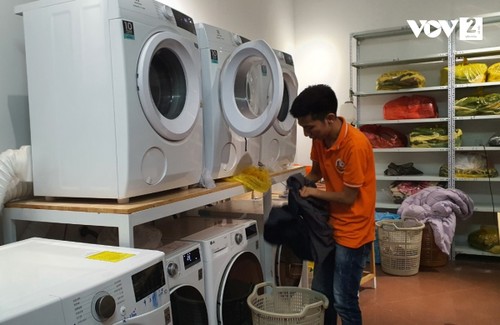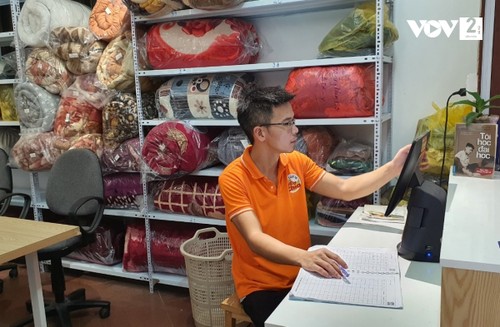 Nguyen Trung Dong can operate washing machines and dryers. (Photo: VOV) Nguyen Trung Dong can operate washing machines and dryers. (Photo: VOV) |
Nguyen Trung Dong, a native of Ha Nam province, was once rejected for a job because his hands have lost the ability to hold things. With no job and no income, his life was very difficult. But Do Van Hieu gave him a job and renewed confidence.
Dong recalled, “I was unemployed and just stayed at home, helping my mother take care of the children. It was boring. Since I got a job, I feel happier and more confident. I do this job enthusiastically and whole-heartedly.”
Working for Hieu’s laundry has changed the life of Tran Van Luan, who is from Thua Thien-Hue province. Luan told us he was unable to find a job because of a physical defect in his legs which makes it difficult for him to move around.
His attempt to earn a living by raising chickens failed because of his lack of knowledge and limited mobility. So he turned to making votive paper. That job was better suited to his abilities, but the income was unstable.
 In addition to washing, ironing, and folding clothes, Tran Van Luan is also in charge of receiving and returning the items to customers. (Photo: VOV) In addition to washing, ironing, and folding clothes, Tran Van Luan is also in charge of receiving and returning the items to customers. (Photo: VOV) |
His life was precarious until he got a job at the “Shared Laundry”, a job compatible with his physical disability which pays a monthly salary beyond his expectations. At this laundry he and his colleagues compensate for each other's defects.
“The work at the laundry is compatible with the disabilities of my friends and me. We can help each other. For example, I have difficulty moving around, but my co-workers, who have disabilities in their hands, are able to walk quickly. On the other hand, my hands are fine, so I can help them do the work that needs manual dexterity,” said Luan.
Before opening the “Shared Laundry” that employs mostly disabled people, Hieu had two other shops that employed no disabled employees.
He recalled once turning down a person with a leg disability. Then he reconsidered his attitude.
“I thought about it for a long time and realized that the work at the laundry is not very heavy and requires little mobility. So I contacted that disabled applicant and offered him a chance,” said Hieu.
As Hieu anticipated, the disabled worker was able to do the work and had a strong desire to keep improving himself.
Workers with disabilities tend to be hard-working, dedicated to their work, and very loyal.
They have no intention of changing jobs. Their advantages inspired Hieu to open a new laundry, called the Shared Laundry, which employs primarily handicapped workers.
Hieu says many of his customers come in wanting to help people with disabilities by using his laundry services. But he and his workers understand that if the service quality they provide doesn’t justify the money the customers spend, they won’t return.
“From the moment I decided to open the Shared Laundry, I reminded my disabled workers that the customers come here because they love them, but if they don’t get the clothes clean, the customers’ sympathy will wear thin. If the customers don't return, we’ll all fail to keep our jobs. They all understand that and do their best to provide high quality laundry service,” said Hieu.
Hieu now has four laundry locations and intends to convert them all to the “shared laundry” model by recruiting more people with disabilities.